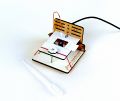| Line 1: | Line 1: | ||
==Microscopy== | ==Microscopy== | ||
=== Microscopy with Oil Immersion=== | |||
"In light microscopy, oil immersion is a technique used to increase the resolving power of a microscope. This is achieved by immersing both the objective lens and the specimen in a transparent oil of high refractive index, thereby increasing the numerical aperture of the objective lens. Immersion oils are transparent oils that have specific optical and viscosity characteristics necessary for use in microscopy."(https://en.wikipedia.org/wiki/Oil_immersion) | |||
[[File:Immersionsvorteil.jpg|thumb|"Principle of immersion microscopy. Path of rays with immersion medium (yellow) (left half) and without (right half). Rays (black) coming from the object (red) at a certain angle and going through the coverslip (orange, as the slide at the bottom) can enter the objective (dark blue) only when immersion is used."(https://en.wikipedia.org/wiki/Oil_immersion)]] | |||
Further read and how to: http://www.micrographia.com/tutoria/micbasic/micbpt07/micb0700.htm | |||
===DIY Microscopy=== | ===DIY Microscopy=== | ||
*[[GMU:DIY-Microscopy]] | *[[GMU:DIY-Microscopy]] | ||
Revision as of 13:49, 18 October 2017
Microscopy
Microscopy with Oil Immersion
"In light microscopy, oil immersion is a technique used to increase the resolving power of a microscope. This is achieved by immersing both the objective lens and the specimen in a transparent oil of high refractive index, thereby increasing the numerical aperture of the objective lens. Immersion oils are transparent oils that have specific optical and viscosity characteristics necessary for use in microscopy."(https://en.wikipedia.org/wiki/Oil_immersion)

Further read and how to: http://www.micrographia.com/tutoria/micbasic/micbpt07/micb0700.htm
DIY Microscopy
Related projects
Ingmar Riedel-Kruse lab at stanford university
Trap it!, http://web.stanford.edu/group/riedel-kruse/publications/CHI517-lee.pdf
Museum visitors could use blue, green or red light to draw patterns on the screen and observe how the Euglena reacted. The microorganisms avoided blue light, so drawing a circle around one of the microbes would trap it, which became the name for one of the scientific mini-games
Euglena soccer, https://www.youtube.com/watch?v=3lwU9deF8rw start at 27:05, https://www.youtube.com/watch?v=Pdx7BkYSCq4
Players earn points by guiding the Euglena through the goal posts.
GMU
Blocksworld repopulated! (2016), http://biogames.eu/
“The BioGame ‘Blocksworld repopulated!’ gives you the opportunity to plunge into a labyrinth populated by microorganisms that you can interact with. Instead of encountering programmed entities in ‘Blocksworld repopulated!’ you are playing with living Euglenas, uni-cellular organisms that are part plants and part animals.”

